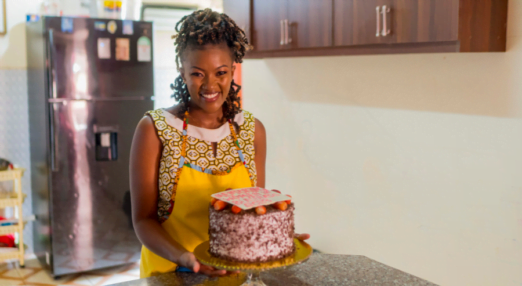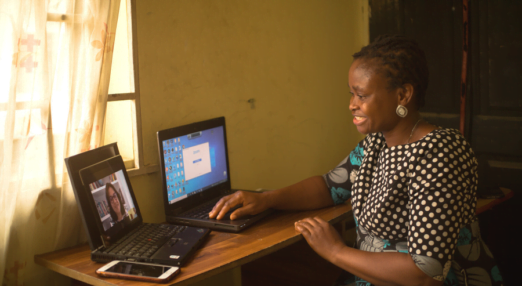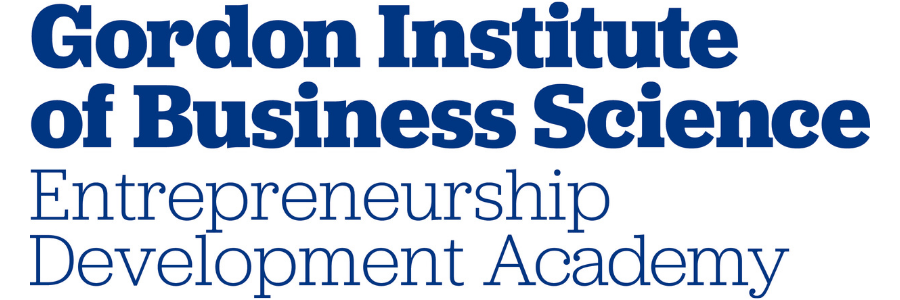Nkeletseng & Glory’s story: Leading young people away from crime
Nkeletseng Tsetsane runs a social enterprise in South Africa. She joined our mentoring programme and was paired with DHL's Glory Mutai.

Programme
Date
2024
Location
Johannesburg, South Africa and Nairobi, Kenya
Nkeletseng Tsetsane is the Founder of Cuffed Urban Streetwear, a social enterprise that creates employment opportunities for young ex-offenders in Johannesburg, South Africa. She joined our Mentoring Women in Business programme and was paired with Glory Mutai, a National Customer Manager at DHL in Nairobi, Kenya. They worked together for a year, improving the back-end operations of Nkeletseng’s business so that she can continue to make an impact for young people. Here, they share their experiences.
Nkeletseng’s reflections
“Working with ex-offenders is particularly important because I view them as marginalised groups. Many of these people were incarcerated as minors. When they made whatever mistakes they made, they were still just teenagers figuring life out. Often, their mistakes were linked to poverty and inequality, which are at the core of most social ills.
Increasing employment opportunities for ex-offenders is key for successfully reintegrating them into their communities and supporting them to move forward with their lives. However, unemployment rates in South Africa are high, even among young graduates, so the odds of getting hired as a young ex-offender are even lower. With no way to earn an income, many ex-offenders feel pressured to resort to unlawful methods of providing for themselves and their families.

Starting my business has given me the opportunity to live my dreams.
My business helps these young people to utilise the clothing construction skills that they learned through rehabilitation programmes while they were incarcerated, so they can make a sustainable living away from crime. We create platforms at our shop and online for them to display their items so people can walk in and buy. We also provide mentorship: It’s one thing for them to be able to create and sell, but there’s also so much more support that they need because of their background.
I definitely think that this work is my calling. Initially, I didn’t plan on becoming an entrepreneur, but I’m passionate about creating an impact and in order to do that, you need to generate an income. So, I studied social entrepreneurship at Gordon Institute of Business Sciences, to get some guidance on how to create a balance between social impact and profits.
I realised there were many ways that I could support ex-offenders, but I decided that a fashion-based social enterprise was the right move for me. This is partly because it tied in with the skills they were already learning, but also because my daughter is passionate about fashion and hopes to work in the industry when she’s older. I felt I had a responsibility as a mother to create a business that she can take over one day when she’s finished her degree or qualifications. It felt like a perfect alignment of our interests.
Starting my business has given me the opportunity to live my dreams. If you do what you love, you never have to work a day in your life. Even if I wasn’t paid to do this, I would do it without blinking.

There’s a lot of mom guilt that comes with entrepreneurship, because you miss important dates at your children's school and are not always available at home.
I think having to balance all the priorities in one’s life will always be a top challenge for women in business. Being a mother, being a wife, being a sister, being a daughter, all while being an entrepreneur means there will always be conflicting priorities. You must have your business cap on where you’re here telling staff: “This needs to be done.” Then you go home, you must wear a different hat. There’s a lot of mom guilt that comes with entrepreneurship, because you miss important dates at your children’s school and are not always available at home.
I entered the Mentoring Women in Business programme in hopes that I could be mentored by someone who has experienced similar challenges. I had an amazing mentor, Glory, all the way from Kenya. We are so alike in so many ways. In our first session, one of the things we said was: “I don’t understand how the matching can be so spot on.”
Being mentored by Glory supported me both personally and professionally. In terms of business, I think one of the biggest impacts that she made was linking us up with the DHL office here in South Africa. We met an e-commerce specialist who supported us to learn more about exporting, which we hope to do in the future. It was such a valuable experience for me and my team.

I believe that I’m the product of many women who have opened doors for me throughout my life, so it’s important for me to hold those doors open for the women who come after me.
Glory and I worked together to evaluate my business’ strengths and weaknesses. It opened my eyes to what improvements could be made. Our compliance was a bit of a mess, so we identified new systems that have helped sort it out. Now that my business is running more efficiently, I can make an even bigger impact for ex-offenders.
I believe that I’m the product of many women who have opened doors for me throughout my life, so it’s important for me to hold those doors open for the women who come after me. The Mentoring Women in Business programme taught me how to be a better mentor to other women entrepreneurs. I had already been mentoring women for a while, but the programme’s resources helped me add more structure to my mentoring relationships, which made them more impactful for my mentees. I’m passing the lessons I learned on to them and I’m sure they’ll pass those lessons onto another woman that they mentor as well. That’s what women do!”

Glory’s reflections
“DHL was looking for employees to participate as mentors and my colleagues asked if I would be interested in joining. At first, I was a bit worried about adding to my workload, but I was also keen to have such a unique opportunity to connect and collaborate with a woman entrepreneur. I decided to go for it.
The first time Nkeletseng and I spoke, our conversation lasted nearly two hours. It was supposed to just be an introduction meeting, but I loved her from the onset. I think my first impression of her was very accurate. I could tell she was energetic, passionate, charming and ambitious. I could also see that she was making a huge difference in her sphere of influence. I’m so glad I took the time to participate in the programme and that I got to know her.

One of the best things about being Nkeletseng’s mentor was watching her confidence grow.
DHL is a purpose driven organisation. Our mission is connecting people and improving lives. When I got to know Nkeletseng, I realised that her business was working toward that same goal of making people’s lives better. That concurrence of mission made us the perfect match.
Once I’d gotten to know her and understand her mission, the next step was to understand her struggles. One of the challenges that we identified together was financial management. Social enterprises are unique because there is an element of needing to run a business that makes money but then there is also the element of needing to help people. It’s best to segment your finances so that you can better understand the financial performance in both of those areas of work. Since I have a strong background working with financial institutions, I was able to support her in that segmentation process.
One of the best things about being Nkeletseng’s mentor was watching her confidence grow. At the time, she was talking about working within South Africa, but as her confidence levels changed, so did her ambition. We started exploring the idea of going international, bringing the impactful work she does to new markets. I’m very excited because plans are currently underway for her to have visibility in other countries and do cross-border trade. I was able to connect her with my colleagues at the DHL office in South Africa to get that process started.

Through the programme’s resources and webinars, I was able to upskill and build my confidence as a leader.
I came into the mentoring programme thinking about what I could offer to my mentee, but I ended up gaining a lot as well. Mentoring taught me many valuable skills that have helped me in my own life. I improved my listening and negotiation skills, which is something I carry with me to this day. Through the programme’s resources and webinars, I was able to upskill and build my confidence as a leader.
Being a mentor opened my eyes to new opportunities that I didn’t see clearly before. At DHL, we work with a lot of clients in the financial sector, as well as many women-owned MSMEs. I realised that we had the opportunity form partnerships that create a bigger impact for women’s businesses. We have now begun a partnership with one of the banks here in Kenya to train MSMEs.
If you’re thinking of becoming a mentor, I highly recommend doing it. You might worry that you don’t have anything to offer a mentee, but your skills and experience are valuable. You have way more to offer than you might be giving yourself credit for and someone out there could be searching for the skills If you’re working in the private sector, mentoring is especially fulfilling, because it gives you the opportunity to use the resources and experience you have in the corporate world to make a difference in someone else’s life. It will have a huge impact on your life as well.”

Read more mentoring success stories
-

Ellah & Gwynneth’s story: One woman’s success uplifts thousands more
Ellah Omezi is an entrepreneur in Abuja, Nigeria. She joined our mentoring programme and was paired with Gwynneth Anderson, a PayPal employee based in Washington DC, USA.
Read more
-

Esther & Jennifer’s story: a recipe for mentoring success
Esther Gathage is the owner of Herstee's Bespoke Cakes. She was matched with her mentor, DHL's Jennifer Thompson, for a year of collaboration.
Read more
-

The Power of Mentoring: Odunayo and Mireille’s story
Odunayo joined our Mentoring Women In Business programme in 2021 and was paired with her mentor Mireille. Here, they reflect on their mentoring relationship.
Read more

